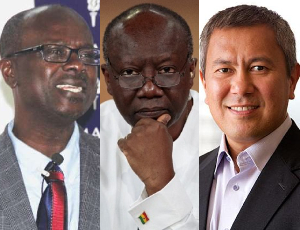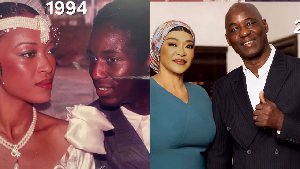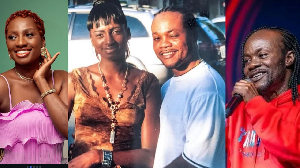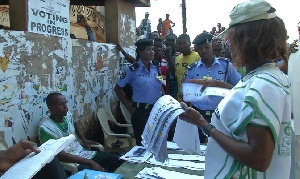How the Busia government and the judges dealt with bias case in Sallah v A-G
Gabby Asare Otchere-Darko
Ghana’s Deputy Attorney-General recently introduced an element of
footsoldierism to the courts by announcing on radio that the presiding
judge in the murder case involving 2002 killing of the King of Dagbon,
Ya-Naa Andani II, was bias. With that he has succeeded in getting the
judge to excuse himself from the case. So with what frame of mind is the
next judge expected to be in?
In the words of the judge at the centre of it, “I have felt insulted,
scandalised and indeed bastardised all in the name of the
Attorney-General’s office attempt to play politics with the Bench in
general and with me in particular.” Strong, damning words from the Bench
to Government’s top legal officer.
Barton Oduro succeeded in letting the whole world-wide-web believe that
the judge was actually recorded in a drinking bar ridiculing the
prosecution case before him while he was under the influence of alcohol.
Justice Anthony Oppong said in stepping down from the case. “Barton Oduro
Esq accused me of being a drunkard and being irresponsible enough to have
gone to a drinking bar and under the influence of alcohol made prejudicial
comments about the case. I vehemently deny thus. I have never been to a
drinking bar and made any comment whatsoever on this Ya-Naa’s murder case.
I challenge Barton Oduro Esq to substantiate this allegation or render an
unqualified apology to me for running me that down.”
The Deputy A-G’s allegation triggered an avalanche of insults and threats
against the judge, forcing him to withdraw from the case. Yet, when the
Deputy A-G was asked to provide evidence he could only say that what he
has captured on tape is the voice of an unnamed lady alleging that she
heard or overheard the judge at a bar. In short, hearsay.
Under such circumstances, the A-G, who may already be worried about the
strength of his case, considering the pressurized political background
that led to it, would have been in his rights to first assure herself of
the credibility of the lady’s allegation and proceed quietly to file a
motion on notice asking that Justice Oppong be disqualified from hearing
the case, particularly were the lady making the accusation prepared to
testify in court to back it. For a country where people make a profitable
industry out of rumour-mongering and peddling false allegations
responsible people should first satisfy themselves on the facts alleged
before giving it currency.
A a similar issue came up forty years ago in a similarly charged political
atmosphere – that time between the UP people (under the ruling Progress
Party) and those of Nkrumah’s CPP. The case was Attorney-General v
Sallah. Yet, in that case, when the rumours started making the rounds
about the judicial bias the Attorney-General went directly but quietly to
the Chief Justice to complain of possible judicial bias. Acting Chief
Justice Azu Crabbe informed the Attorney-General, NYB Adade, that if his
informants were willing to come forward to substantiate their allegations
of bias against two of the five Supreme Court judges sitting on the case,
the A-G could take up the matter in open court. And, that was how the
matter was pursued – civilly.
In the Oduro Barton case, the judge was right in condemning the modes of
objection chosen by the A-G and her deputy. The judge held, “Perhaps Baron
Oduro Esq, forgetting that being Deputy Attorney-General he is the second
leader of the Bar and in this regard a higher standard of legal practice
is expected of him. Why would a person of that calibre go on radio and use
me as a pawn to score cheap parochial political points, painting me as the
worst judge in this country? He should be ashamed of himself. He must be
told that that is not how we take objections to judges sitting on a case
for whatever reasons.”
After the National Chairman of the governing NDC made that reckless
statement that his party would cleanse the judiciary for the CJ using one
of several ways to kill a cat to accomplish that task, his apologists were
quick to refer to the case of Salla v Attorney-General (in the Court of
Appeal sitting as the Supreme Court, 20 April, 1970). As we are quick to
do here in Ghana, they refer to Prime Minister Busia’s controversial ‘No
Court!’ statement to show that even the founding fathers of the NPP
tradition disregarded judicial independence.
There, Kofi Badoo’s paper, the Spokesman, which served as the main voice
of the left, put a spin on an otherwise uncontroversial but not
politically advisable statement from Prime Minister Busia that even though
the Supreme Court had ruled in favour of a declaration sought by Mr Sallas
over his dismissal as a public servant, by common law practice, “no
court” could compel Government, or for that matter, any employer, to
employ a person it does not wish to work with.
In the Sallah case itself, 568 public servants received dismissal letters
on 21 February 1970 from a presidential commission, acting in pursuance of
a constitutional provision. Sallah, a former GNTC manager was one of the
affected workers, who took the matter to the supreme court for a
declaration that upon proper interpretation his office fell outside of
the offices contemplated by that constitutional provision.
The judges who sat on the case -- from March 16-18, 1970 -- were Apaloo,
Siriboe, Sowah, Anin and Archer.
But, as the judges were deliberating to give their ruling, on March 24 the
A-G filed a motion on notice asking that justices Apoloo and Sowah be
disqualified from sitting and taking part in the hearing for fear of bias.
That trial within trial in the Sallah case gives us some education in what
to do and what not to do when you suspect judicial bias.
Victor Owusu, External (Foreign) Affairs Minister at the time swore an
affidavit to the effect that Justice Sowah had more than a judicial
interest in the Sallah case because whiles on the golf course with Justice
Sowah, the judge told him that after the Presidential Commission ordered
the dismissal of the so-called Apollo 568, the half-sister of Justice
Sowah, a Mrs Jonas, approached the judge in tears and asked him to help
her husband whose employment had been terminated to be reinstated. Mr
Jonas was formerly of the Lands Secretariat.
The A-G argued that not only was Justice Sowah related to one of the 568
affected workers, but that by talking to a cabinet minister, Victor Owusu,
about it he had indeed taken steps to implement the request of his sister,
whose husband was nevertheless still an Apollo 568 victim.
In the case of Justice Apaloo, several witnesses came to testify that he
was a close personal friend to Sallah and that the relationship between
them was so intimate that it would be difficult, if not impossible, for
him to decide the case impartially. The allegation as retold below had a
cunning semblance to that against Justice Oppong today.
When the evidence of the witnesses was put to strict proof it was found to
be an “infamous invention”. Two of the three witnesses were journalists
and Moslems – Alhaji Yakubu and Fatayi Braimah. They said on February 7,
1970 they went to dine at the Hotel Continental (now Golden tulip) at
about 10pm where they saw Justice Apaloo, Mr Sallah and two ladies dining
together at one table. They said they went to eat there after seeing
pilgrims off at the airport to Mecca. They both said the flight departed
at 1am.
The Duty Officer of Ghana Airways testified that on the night in question
the Haj flight to Mecca departed on schedule at 10pm. Another witness, the
Restaurant Manager at the Hotel Continental told the court that there were
only two dinners for four people that evening at his restaurant, one of
which was paid for by a resident of the hotel and the second through a
charge account by a name which was neither Apoloo nor Sallah. The other
order contained pork, which according to the court, “no Moslem, not to
mention an Alhaji or one who had just seen off a pilgrimage to Mecca,
would touch. The evidence of those two witnesses must therefore be
rejected as an infamous invention.”
It was not in dispute that Apaloo knew Sallah, even Victor Owusu also gave
evidence to that effect. Defence lawyers, led by Joe Rheindorf, did not
dispute the friendship but the level of intimacy argued by the A-G. The
court held, “there was the opinion volunteered by Mr Victor Owusu, a
Minister of State, that from his knowledge of both Justice Apaloo and the
respondent he would describe their relationship as that of very close and
intimate friends. We are bound to give the most serious consideration and
to pay respect to the opinion of a Minister, but we would have wished for
some factual statement of the basis of his opinion to enable us evaluate
for ourselves the degree of friendship in order to determine if it would
give rise to that likelihood of bias which the law should avoid…
Unfortunately, we had no such facts from the Minister.”
It was held, “In objections like the instant one, evidence is not often
required because the facts, which are often true, are uncontroverted. But
where the facts are controverted as in the instant application, they must
be proved.”
Barton Oduro should read Justice Amissah’s reasoning: “Upon consideration
we reject [the story of the two Moslems witnesses] as an infamous
invention. It is a matter of concern that on an issue as grave as this
and in a case of such importance when the reputation of a judge of the
superior courts of the land is, in the conditions of the country, bound to
suffer in some measure, whatever lawyers might say about the harmless
nature of objections on the ground of bias, by a mere allegation however
baseless it is, no prior attempt seems to have been made to check this
story before it was given currency. It is even more disquieting when it
is realised that the allegation was made through one who has the whole
investigating machinery at his disposal.”
On the objection against Justice Sowah, the court held that the testimony
given by Victor Owusu “was not evidence but hearsay and that where the
evidence was available there was no reason why in a matter of this
gravity, we should be treated on this as well as on other allegations to
hearsay… On the fact of [Victor] Owusu’s deposition, the case cannot be
put above a casual reference to Mr Jonas’ plight made by Justice Sowah in
conversation in a sporting club with Mr Owusu. That the direct evidence on
the point falls so markedly short of the hearsay gloss put on it must
serve as a warning of the danger in relying upon hearsay as a means of
proof…”
With Justice Siriboe dissenting, Justices Amisaah, Jiagge, Anin and Archer
threw out the objection motion on the bases that the evidence did not
support allegations of bias sufficiently to disqualify the two judges and
that the standard of proof must be that applied in a civil case – on
balance of probability.
They held, “We do not think that in that case there is any justification
for lowering the standard of proof. If that is done the courts would be
laying themselves open to the danger we spoke of before, namely, of giving
the party the right to choose his own judge. We do not think that the
courts should be reduced to the position in which parties before them may
assume the competence of judges to decide in their favour but their
incompetence to decide against them. And that is why the allegations of
fact when challenged must be proved.“
Referring to an affidavit by state attorney EE Mensah, the court held that
the A-G seemed to suggest “that talk and gossip of the relationships
described are ‘assuming scandalous proportions and appear to be
undermining public confidence in the independence and impartiality of the
judiciary,’ we have already indicated our opinion that in a matter of this
nature idle talk and gossip cannot be the measure of the dependence or
independence of the judiciary. But, further, in a society where it is
generally recognised by all right-thinking people that rumour-mongering
ought to be stamped out, and ought to be stamped out rigorously, the least
the judiciary can do is to refuse to be deflected from what they believe
to be their duty by whatever goes by the description of ‘talk and
gossip’…”
The wisdom in that judgment given more than 40 years ago should help us
today as, like then, the country seems divided on partisan lines. Then in
a move to purge the civil service of the serious politicisation it
experienced under the First Republic Section 9(1) of the Transitional
Provisions, as restated in the First Schedule of the 1969 Constitution,
which came into force on 22 August 1969, provided that “any person holding
a public office under the National Liberation Council shall after the
Constitution comes into force, continue to hold that office only for six
months unless reappointed.”
568 persons lost their jobs. This was the hot issue at the time and the
government at the time lost the case before the highest judges of the
land. It was a matter of unfair dismissal which ordinarily leads to
damages and not necessarily reinstatement.
Sallas’ writ of summons and statement of claim sought: “a declaration that
on a true and proper interpretation of the provisions of section 9(1) of
the First Schedule to the Constitution (Part IV) the Government of Ghana
was not entitled to terminate the plaintiffs appointment as a manager in
the Ghana National Trading Corporation.”
The defence argued that section 9(1) dismissed all public servants or gave
them notice to the effect that after six months from 22 August, 1969 their
services would no longer be required. The plaintiff counter-argued that
such an interpretation would be inconsistent with Article 138 of the
Constitution which protected public servants from dismissal or removal
without just cause. Section 9(1) was clear that “save as otherwise
provided in this Constitution” and “as far as is consistent with the
provisions of this Constitution.”
Justice Archer, articulating the majority view, held, “It sounds strange
that the whole gallant army of soldiers and police who brought about the
revolution should all be dismissed by the very Constitution which came
into force as a result of their prowess. It would mean that all doctors,
nurses, locomotive drivers, firemen, teachers, sanitary workers and every
employee in the public service were all dismissed.”
The court agreed with the argument of the plaintiff the MLC introduced
various committee and appointed various commission and established offices
upon assuming power and it was only natural that the new government would
wish to review and make the necessary adjustments to suit its own
administration in conformity with the provisions of the new constitution.”
Today, some public servants of the previous government are winning cases
in court and the ruling party and the A-G are accusing judges of political
or judicial bias purely on hearsay. The facts and ruling of the Sallas
case, both the substantive case and the mini trial, suggest that we have
lessons from the past but we don’t seem prepared to let the imperatives of
learning from those lesson get in the way of our short term partisan
considerations.
The author is the Executive Director of the Danquah Institute –
gabby@danquahinstitute.org
Opinions of Saturday, 28 August 2010
Columnist: Otchere-Darko, Gabby Asare














